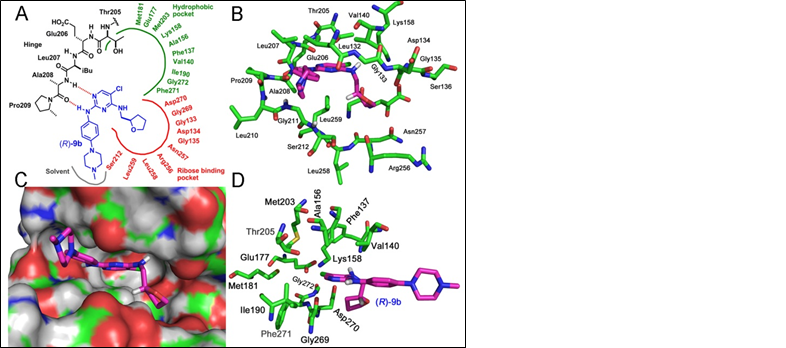
ACK1-AR signaling
Androgen Receptor (AR)
AR plays a paramount role in the onset and progression of prostate cancer (PC). This very facet underlies androgen deprivation therapy (ADT), a preferred treatment to negate AR transcriptional co-activator activity. While treatment with AR antagonists or orchiectomy provides immediate palliative benefits, these ADTs are ineffective long term, as the recalcitrant disease recurs within 2-3 years. A majority of the PC patients progress to a lethal stage of the disease, referred to as the metastatic Castration Resistant Prostate Cancer (mCRPC). Consequently, resistance to ADT has become one of the most vexing problems in PC therapy and thus, CRPC remains an incurable malignancy with limited treatment options.
Need to venture beyond Anti-Androgen Therapies
CRPC cells rely on AR for their growth despite androgen-depletion. Enzalutamide, a second generation AR antagonist, although efficiently suppressed AR transcriptional activity by overcoming its nuclear translocation, the overall survival advantage was found to be ~6 months, and most patients relapsed within 2 years. Interestingly, these relapsed patients exhibit renewed AR target gene expression. AR-V7 splice variant may be a clinically relevant mechanism for resistance to enzalutamide and androgen-synthesis inhibitor, abiraterone, in CRPC patients. Overall, the relative short-term efficacy of enzalutamide and abiraterone revealed two major caveats,inhibition of AR protein activity is not enough, to achieve complete remission, ablation of AR transcription is the key. However, targeted inhibition of AR and its splice variant, AR-V7 transcription, with small molecule inhibitors has not yet been accomplished.ACK1 in CRPCs
ACK1 is a structurally unique non-receptor tyrosine kinase that is upregulated in ~25% of prostate adenocarcinomas. Importantly, 10 out of 13 CRPCs exhibited 5- to >100-fold ACK1 overexpression. Further, LNCaP cells that are poorly tumorigenic in castrated mice, formed robust CRPC tumors following expression of activated ACK1. Moreover, expression of activated ACK1 not only correlates positively with the progression of disease to CRPC stage, but also revealed that patients that display moderate to strong staining of activated ACK1 have poor prognosis. Combined, these studies have established a crucial role for ACK1 in prostate cancer pathogenesis.ACK1, a histone kinase
Serendipitously, we uncovered that ACK1 tyrosine kinase interacts with AR and ACK1/AR complex is targeted to chromatin to regulate a distinct transcription program in PC cells. Strikingly, ACK1 regulated AR and AR-V7 transcription by regulating deposition of novel epigenetic marks, histone H4 Tyr88-phosphorylation directly upstream of AR locus. Realizing importance of novel signaling axis, we developed a new class of ACK1-specific small molecule inhibitor (R)-9bMS. Inhibition of ACK1 by (R)-9bMS suppressed AR & AR-V7 transcription, inhibiting proliferation of enzalutamide-resistant CRPC cells and tumor growth. Based on these data, we hypothesize that CRPC cells acclimatize to second generation of anti-androgens such as enzalutamide by upregulating AR & AR-V7 transcription in an ACK1 kinase-dependent manner. Conversely, inhibition of ACK1 suppresses AR & AR-V7 expression and sensitizing enzalutamide-resistant CRPCs to (R)-9bMS.
Reference:
- Mahajan K, Malla P, Lawrence H, Chen Z, Sinha CK, Malik R, Shukla S, Kim J, Coppola D, Lawrence N and Mahajan NP*. ACK1 regulates histone Tyr-phosphorylation and AR gene expression in castration resistant prostate cancer. Cancer Cell 2017. Pubmed ID: 28609657
